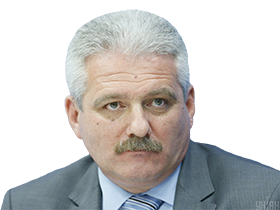Recently, Minister of Foreign Affairs of Ukraine Pavlo Klimkin stated that the European Union had for several months been discussing the issue of strengthening sanctions against the Russian Federation for the illegal construction of the Kerch Strait bridge toward the occupied Crimea. However, sanctions cannot be tied to any particular act.
The Russian side is already suffering losses from sanctions, which only intensify the economic crisis and force the Kremlin to make internal political decisions affecting their economy. For example, this is about recent changes in pension law, increase in VAT, and rising fuel prices, all of which triggered a wave of discontent among Russians...
Sanctions are an instrument of economic war. What Russia is doing today in the Sea of Azov, from the point of view of creating problems for our ports in Berdyansk and Mariupol, is also a manifestation of economic war
Sanctions are an instrument of economic war. What Russia is doing today in the Sea of Azov, from the point of view of creating problems for our ports in Berdyansk and Mariupol, is also a manifestation of economic war. After all, once they've built the Kerch Strait bridge, its side effect is the restrictions on the tonnage of vessels passsing under it. That is, Russia is now creating a situation where owners or users of cargo ships for think have to think twice, whether they should work with Ukrainian ports, because they have no guarantees that there will be no long delays in the sea, which, incidentally, are initiated by the Russian FSB. Of course, this means additional costs for them. This is also a kind of sanctions, it's only that they are not announced, but still applied as a result of the existing bilateral agreements on the joint use of the Azov Sea.
For its part, Ukraine and partner states should apply similar actions to the occupied ports in Crimea. For example, this could be a ban on the supply of goods, denied servicing to vessels leaving those ports, and denied access to cargo shipped from there.
These restrictions would be very useful to apply to Russian ports in the Azov and Black Seas, primarily to the ports of Novorossiysk and Port Caucasus, through which troops and military equipment had been deployed to Crimea.
It should be remembered that sanctions have a cumulative effect – it does not appear immediately after their adoption, although creating a risk zone for other spheres of the economy
The same applies to enterprises located in Russia's Southern Federal District, which has become the base for continuing military operations in Ukraine's eastern Luhansk and Donetsk regions and the continuation of the occupation of the Crimea. Accordingly, it is permissible to say that such enterprises could be deemed sanctioned - they should not be allowed to trade and products shall not be delivered to companies registered in the district, etc.
In addition, it should be remembered that sanctions have a cumulative effect – it does not appear immediately after their adoption, although creating a risk zone for other spheres of the economy. This applies to companies that are not under sanctions and neither are they directly related to what is happening. But due to the fact that the companies are Russia-based and, theoretically, too can be sanctioned, Western partners will start treating them with caution, fearing potential economic losses. However, imposition of sanctions does not mean that Russia will abandon its aggressive actions.
Ukraine should be the initiator of the application and expansion of sanctions, both sectoral and global, targeting certain legal entities and individuals, as well as territories, but for the time being we are lagging on the issue
Ukraine should be the initiator of the application and expansion of sanctions, both sectoral and global, targeting certain legal entities and individuals, as well as territories, but for the time being we are lagging on the issue because we are behind our Western partners in terms of the sanctions' volumes.
In this regard, the first step Ukraine should take is to pass necessary changes to the law on sanctions, taking into account the latest developments, to abolish the law on the free economic zone of Crimea, as it contradicts the economic opposition to the Russian Federation, to amend other laws that could give law enforcers tools to hold accountable any violators of sanctions.
Yuriy Smelyanskiy is an economic expert with the Maidan of Foreign Affairs Foundation


